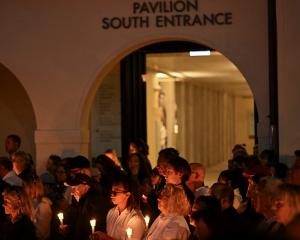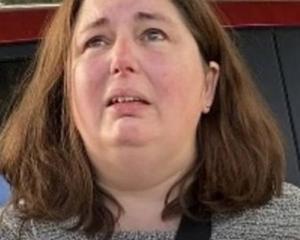
Tuesday's decision, which affects around 4.9 million people, was announced just hours before the busy border between Victoria, of which Melbourne is the capital, and New South Wales is scheduled to close for the first time in a century.
From midnight on Wednesday, everyone in Melbourne will be required to stay home unless travelling to work, studying, shopping for food or attending medical appointments.
Restaurants, cafes and bars will be able to provide takeaway service only, gyms and hair salons closed, household gatherings limited to two people and the current school vacation extended.
Victoria Premier Daniel Andrews said the restrictions were onerous but necessary.
"I would, with the greatest of respect, put it to you getting this virus and dying from it is very onerous too," he said during a televised media conference.
Victoria was responsible for 191 of the 199 new cases reported nationally on Tuesday, the biggest one-day rise since early April. The spike has worried officials, even though the national total of almost 8800 cases and 106 deaths is far below many other countries.
"We have to be clear with each other that this is not over," Andrews said. "And pretending that it is because we all want it to be over is not the answer. It is indeed part of the problem. A very big part of the problem."
Andrews had over the weekend reinstated strict social-distancing orders in more than 30 Melbourne suburbs and put nine public housing towers into complete lockdown because of the recent outbreak.
Hundreds of police officers and army troops were being deployed to enforce the closure of Victoria's border with New South Wales from midnight on Tuesday.
The state line is highly porous, stretching hundreds of kilometres. It is heavily used daily by commuters, school children and road freight.
People caught crossing the border without permission via any of the 55 roads, or several river and wilderness crossings, will face penalties including a fine of $A11,000 ($NZ11,690) and six months' imprisonment.
A second region in Victoria, where recent Covid-19 cases have been detected and which is home to 44,000 people, will face lockdown restrictions similar to Melbourne.
The border closure and reintroduction of restrictions in Melbourne deal a blow to Australia's hopes for quick economic recovery as it approaches its first recession in nearly three decades, driven by social distancing restrictions imposed in March.
Chief Health Officer Professor Brett Sutton confirmed that 37 new cases in Victoria were linked to outbreaks and 154 are under investigation, bringing the state's total to 2824 cases.
The overall total has increased by 164 after 27 cases were reclassified - mainly due to duplication. No cases have been detected in returned travellers in hotel quarantine.
There are currently 772 active cases in Victoria, with 438 potentially from community transmission.
Thirteen new cases have been linked to nine locked-down public housing towers in North Melbourne and Flemington, with the outbreak now totalling 69.
Four cases related to an outbreak among emergency department staff at Northern Hospital Epping, which now totals eight staff and one household contact.
The emergency department remains open with a temporary reduction in non-urgent elective surgery and outpatient appointments.
A new case has also been confirmed in a staff member at the Assisi aged care facility in Rosanna, in Melbourne's northeast.
The staff member did not work while infectious and widespread testing of staff and residents at the facility will begin on Tuesday.
BORDER CHAOS
For businesses on the border, which last closed during the Spanish flu pandemic in 1919, it also poses an immediate logistics headache.
Daily travel permits will be granted to people who live in border towns and cities but with the closure just hours away, the application system was still being developed.
Kevin Mack, the mayor of Albury, a border town on the NSW side, said with an estimated 50,000 car movements across the state line every day "it will be a nightmare for everyone."
"About a quarter of my staff like me live in NSW, and cross that border every day to come to work," said Paul Armstrong, who runs a petrol station in Wodonga, a border town on the Victorian side. "I don't know if they are going to be able to get in."
Outside of the border towns, Victoria residents will be able to apply for a permit, but will need to prove a special need for their travel. Freight transporters will be free to cross the border without a permit, but will be subjected to random stops.
The closure of the border is a blow to Australia's hopes of cushioning the fall as the country heads into its first recession in nearly three decades.
HOUSING RESIDENTS 'FEEL LET DOWN'
Residents of Melbourne's nine locked down public housing towers say they feel let down by the lack of communication, food and supplies.
The Melbourne Public Tenants Association, on behalf of the 3000 residents in the Flemington and North Melbourne estates, say residents have been left in the dark since the state government's hard lockdown was enforced on Saturday.
In a letter addressed to the Acting Chief Medical Officer, the Department of Health and Human Services, Premier Daniel Andrews and Victoria Police, the association describes how residents were forced to wait 24 hours for food and other essentials like baby formula, nappies and medication.
When food arrived they said it was "at best, questionable pre-packaged meat-like food items that does not look suitable for human consumption".
"Furthermore, the delivery of the food was tossed to the floor on a single piece of paper in front of the residents' apartment doors in small portions of one food item per household," the letter read.
Residents say much of the government-provided food is out-of-date, insufficient or culturally inappropriate, such as pork being provided to Muslim families.
Volunteers and residents have also reported the State Emergency Service confiscated donations of food and supplies on Monday night.
A spokesman for State Emergency Services told AAP the deliveries had since been returned.
The experience has left residents feeling "shocked, confused, treated unfairly and unjustly, stigmatised, insulted, disgusted, degraded, frustrated, hurt, let down, defeated, hopeless, tiered (sic), depressed and alone".
Abdiraham Ibrahim, a father of five young children living in a Flemington tower said he was relying on his friends to deliver necessities such as milk and baby formula.
"We are doing the right thing, we are staying at home," he told AAP. "If the government are not providing what we need they shouldn't be stopping people from bringing it."
The residents are unable to leave their apartments for any reason for at least five days, as part of efforts to slow the spread of coronavirus.
The detention could be scaled up to 14 days as authorities work to get everyone tested.
"It doesn't look like we are going to be getting out soon, the order says 14 days and I think that's how long we will be here," Mr Ibrahim said.
"The only time we were not inside was when we got tested, we're a bit worried to go outside with everything that is happening."
About 500 police have been tasked with guarding the estate entrances and corridors. They are receiving assistance from Fire Rescue Victoria and the SES.
- Reuters and AAP













